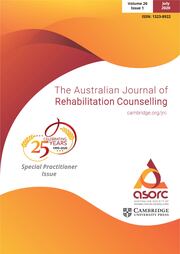Article contents
Individual Rehabilitation Plans, Goals and Outcomes: An Argument for Utilizing Individually Determined Outcome Measures in Rehabilitation
Published online by Cambridge University Press: 27 August 2015
Abstract
The advent of managed care as a system driving purchasing in the health sector has brought with it an emphasis on purchasing outcomes rather than inputs. Although any change in purchasing schemes will have an effect on service providers, it should not prove to be too disruptive for those of us in rehabilitation since rehabilitation as a service system has always been outcome driven. In fact, our entire system is driven by needs based assessment and directed toward the meeting individually identified goals for service. These goals reflect the desired outcome of the service we provide for each individual served. The challenge we face, then, is translating our emphasis on goal directed, outcome driven services to meet the language, understanding and expectations of our funding agents as they begin to adopt a regime of outcome based contracts. The purpose of this paper is to argue the validity of individually determined outcomes as opposed to institutionally determined measures and to propose one method of measuring those outcomes in a manner that is applicable to the needs of the purchaser.
- Type
- Articles
- Information
- Copyright
- Copyright © Cambridge University Press 1999
References
- 1
- Cited by


